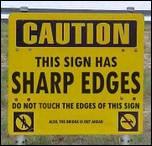| Friday, October 20, 2006 |
| Reverse Importance |
 It used to be that to attract attention to a message you'd make it bigger, more colorful, more important-sounding. "Danger, don't touch the electrical wires!" It used to be that to attract attention to a message you'd make it bigger, more colorful, more important-sounding. "Danger, don't touch the electrical wires!"
But advertising started to mess that up. Gradually, the most attention-grabbing, big, colorful, attractive messages are simply the ones that want to sell you something, but that aren't important at all. Then there was spam. When I get a message that says "Important, Urgent" in the subject line, and its priority is set to high, and it has an attachment, I can pretty much just click the spam button right away. The messages that most try to grab my attention are most likely the ones that I'd least want to see. But it is horrible for good communication. We get used to specifically ignoring the loudest messages. We sort of reverse our instinctive filters. We no longer see the banner ads on web pages, particularly because they're big and colorful, centrally placed, and moving. What if somebody actually has something to say? How should they get my attention? Now, recently, I seem to get a lot of junk messages to my ICQ instant messenger account. Some of it spam, but most of it from people who find me listed. I can't seem to find out how to turn that off. Most of them will try something like "hi" or "hello". Which used to mean "hi" or "hello", i.e. a friendly way of starting a conversation. But I don't want a conversation with some teenager in China who wants to practice speaking English. So, I click the block button right away and close the window. That's what it has come to. Somebody says "hello" and I press the button for the hidden trap door right away, without even checking who it is. If it is somebody I actually know, I don't click 'block', but if they start off with "hi, how are you?", I probably won't answer. Maybe not polite, but I have little interest in starting up a string of small talk messages, to find out if there possibly might be something you want to say. I'm busy. I suppose, if you actually have something to say to me, don't say "hi". Don't send me an urgent message. Don't make it high priority. Don't print it on a colorful billboard. I don't know what I should advice you to do, then, other than say what you actually have to say in the first five words. Or I'll already have forgotten about you. Don't get me wrong. I enjoy hearing from my friends, and I enjoy new friends. You don't have to have anything fantastic to say. But please say it, and without adding to the noise. Are we maybe evolving into being able to recognize meaning more quickly, and quickly filtering out stuff that doesn't have meaning? Without being misled by loudness, colorfulness, apparent friendlyness, or stated importance. That could eventually be a good thing, even though it is annoying. Notice the opposite phenomenon too. The stuff that actually is important to you is often hidden away. Legalese, for example. You start using some new piece of software and it has a long agreement you supposedly agree to when you start using it. Which deliberately has been written to make you not read it, and if you do, to make you not understand what you agree to, while still make it possible to later claim that you did agree to it. American TV ads illustrate it perfectly well. The ad spends 28 seconds setting a mood, presenting you with a vision in color and sound and compelling speech, engaging your emotions and your imagination. And in the last 2 seconds they rattle off the things you really need to know at 10 times the speed. "Causes irreversible liver damage in test animals. Illegal where prohibited. Not suitable for people under 18, over 60, if who're pregnant, if who have allergies. Made of formaldehyde, refined sugar, enriched uranium, genetically modified lifeforms with unknown properties, by slave workers in a third world nation." So, now, if we actually got really good at ignoring the loud distractions, and noticing what really is being said, and maybe what isn't being said, that wouldn't be too bad. But it ain't easy. A great deal of our input isn't communication, but pretends to be, and isn't information, but pretends to be. It needs to be descrambled and decoded and color-adjusted, to find the signal, to find out what really is going on, so I can decide what actually is important to me, and what I should or shouldn't do about it. Which most likely isn't at all what I'm being told most clearly. The loud clear stuff is the noise. The scrambled small print and almost invisible cues is the message. [ Information | 2006-10-20 23:16 | 6 comments | PermaLink ] More > |